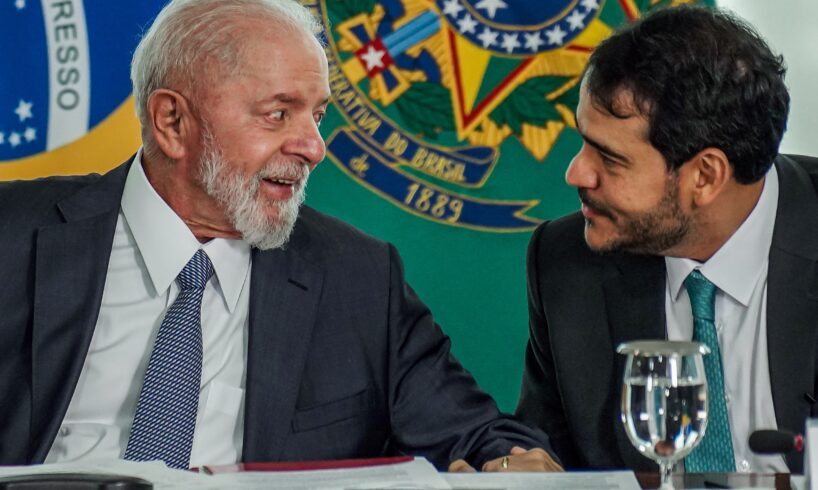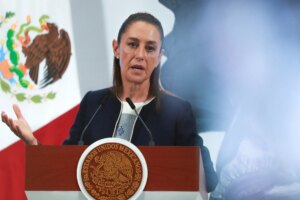
President Lula has nominated Attorney General Jorge Messias to the Supreme Court, the Planalto Palace announced on Thursday (20). His appointment still requires a confirmation hearing and a floor vote in the Senate. Messias was summoned to the Alvorada Palace around 11:30 a.m., where Lula informed him of the decision.
The nomination of a white man to the country’s top court comes on Black Consciousness Day in Brazil, despite public pressure for the president to select a Black woman for the post.
Messias was chosen to fill the seat vacated by Luís Roberto Barroso, who retired on October 18. Lula took just over a month to make the decision, balancing political calculations amid foreign travel—including the COP30 preparations in Belém—and negotiations led by Senate President Davi Alcolumbre, who had pushed for Senator Rodrigo Pacheco.
Messias emerged as the frontrunner soon after Barroso announced his retirement, ending a 12-year tenure on the court.
Lula’s pick reflects two criteria that have guided his recent Supreme Court choices. First, personal trust—also a decisive factor behind the nominations of Cristiano Zanin and Flávio Dino. Second, a political bet that Messias can help strengthen the president’s ties with evangelical voters. A Baptist, Messias heads to the Senate confirmation process backed by influential evangelical leaders such as Bishop Samuel Ferreira of the Assemblies of God (Madureira branch) and Bishop Robson Rodovalho of the Sara Nossa Terra church.
Messias had already been considered for the court in 2023, but that seat ultimately went to Flávio Dino.
Messias, 45, was born in Recife. If confirmed by the Senate, he could serve on the court for up to 30 years. He holds a law degree from the Federal University of Pernambuco (UFPE) and joined the Attorney General’s Office in 2007 as a Federal Treasury prosecutor.
He has served as deputy chief of legal affairs at the Presidency, secretary for higher-education regulation at the Ministry of Education, and legal adviser at the ministries of Education and of Science, Technology and Innovation. During the presidential transition, he worked on the transparency, integrity and oversight task force.
Tensions with the Senate
Although Messias was Lula’s clear favorite from the outset, some Supreme Court justices encouraged the president to choose a nominee closer to Senator Rodrigo Pacheco, the former Senate president. Pacheco also had the backing of Alcolumbre, who had tried to forge a Senate agreement in favor of his ally.
Justices such as Alexandre de Moraes and Gilmar Mendes were said to favor Pacheco, who defended the court during attacks from lawmakers while leading the Senate. Still, the court did not indicate that it would resist a Messias nomination.
In 2023, Lula also weighed Messias and Pacheco when Rosa Weber retired, but ultimately selected Flávio Dino, then justice minister.
On Monday (16), Lula informed Pacheco of his decision to nominate Messias. During the meeting, Pacheco told the president he would leave public life and would not run for governor of Minas Gerais, despite Lula’s preference.
As previously reported by Valor, the choice frustrated Alcolumbre—Pacheco’s main political sponsor—and senators aligned with the two. According to people close to the Senate president, he is “dissatisfied” and believes Lula’s decision could trigger a “crisis” in the upper house.
Alcolumbre controls the agenda for confirmation votes after the Senate Judiciary Committee issues its recommendation. He could repeat what he did under former President Jair Bolsonaro, when he delayed a vote on André Mendonça’s nomination to the Supreme Court in the Judiciary Committee for four months. If he adopts the same strategy, Messias’s confirmation hearing could be pushed into 2026, adding pressure to the presidential succession cycle.
Another potential reaction could surface in the Senate vote on the anti-gang bill. The Chamber of Deputies has already approved the measure, and Alcolumbre may decline to help the government restore provisions removed by deputies.
Resistance to Messias among a group of senators is not linked to his personal profile but stems from lingering frustrations after Lula’s previous pick, Flávio Dino, who had been a senator. Lawmakers were disappointed with Dino’s stance during debates on tighter, more transparent rules for parliamentary earmarks.
Messias’s allies, however, note that he already has between 29 and 31 committed votes, including support from opposition senators who share his evangelical background. He needs 41 votes for confirmation. They believe that once the nomination advances, Lula’s personal involvement and the government apparatus will secure the remaining support.
In October, in what was seen as a gesture toward Congress, Messias issued a legal opinion favoring the constitutionality of budget earmarks under review at the court as long as transparency standards are met. These amendments are among the issues most closely watched by lawmakers and are the subject of multiple investigations before the court.
Future in the court
Messias could inherit the remaining Car Wash cases. The docket was overseen by Edson Fachin until he became chief justice and was later transferred to Barroso. Typically, a new justice inherits the caseload of the predecessor.
However, internal arrangements have sometimes reassigned cases before a new justice takes office. That happened, for example, with the Operation Spoofing cases, which were moved from Ricardo Lewandowski to Dias Toffoli before Cristiano Zanin joined the court.
Messias will also fill Luiz Fux’s seat on the First Panel, participating in appeals involving defendants convicted in the Supreme Court’s rulings on the January 8 coup attempt. Fux transferred to the Second Panel in October.
This article was translated from Valor Econômico using an artificial intelligence tool under the supervision of the Valor International editorial team to ensure accuracy, clarity, and adherence to our editorial standards. Read our Editorial Principles.
Mais recente
Próxima
Government tries to shape Senate version of anti-gang bill





